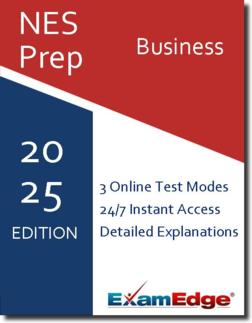NES Business (309) Practice Tests & Test Prep by Exam Edge - Topics
Based on 37 Reviews
- Real Exam Simulation: Timed questions and matching content build comfort for your NES Business test day.
- Instant, 24/7 Access: Web-based NES Business practice exams with no software needed.
- Clear Explanations: Step-by-step answers and explanations for your NES exam to strengthen understanding.
- Boosted Confidence: Reduces anxiety and improves test-taking skills to ace your NES Business (309).

Understanding the exact breakdown of the NES Business test will help you know what to expect and how to most effectively prepare. The NES Business has 150 multiple-choice questions The exam will be broken down into the sections below:
| NES Business Exam Blueprint | ||
|---|---|---|
| Domain Name | % | Number of Questions |
| Business Management, Law, and Ethics | 19% | 28 |
| Accounting, Personal Financial Management, and Quantitative Analysis | 19% | 28 |
| Economics and International Business | 19% | 28 |
| Marketing, E-Commerce, and Entrepreneurship | 19% | 28 |
| Business Communications, Technology, Career Development, and Professionalism | 25% | 37 |


